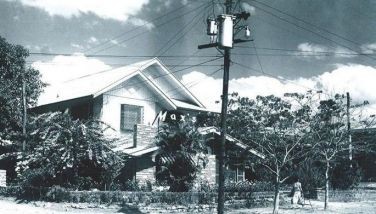Senior Act

Filipinos can be proud of its strong support to the elderly. Not only do we have a set of laws for senior citizens that are the envy of many developing countries, our family support system remains positive, nurturing and appreciative.
No wonder the numbers of our elders continues to swell. Some five million people aged 60 years and older now account for about nine percent of the current population, and this is expected to increase to about 12 percent by 2025.
And yes, with so many exemptions and benefits enjoyed by our senior citizens, it’s amusing to see aged 60-and-up groups of five or more taking pleasure in discounted lunches or dinners at various eating establishments or seeing for free a good movie.
Many of our countrymen now look forward to retirement age with so much relish! There’s a long list of “freebies” and discounts that are made available to holders of that “magic card” issued by Office of Senior Citizens Affairs under the city or municipal mayors’ office.
Aside from getting 20 percent discount on medicines, medical and dental fees, transport fares, services in hotels and restaurants, and admission fees in theaters and other places of leisure, there’s a five percent discount on water and electricity charges. And just recently, these transactions are exempt from the value-added tax.
Other previous supportive laws on senior citizens
There are number of significant legislative actions in recent years that have served to strengthen institutional support for the elderly. Most popular, of course, is the 20 percent discount first embodied in RA 7432 passed in July of 1991, and later enhanced in two other laws.
One of the earlier laws, passed in 1983, called attention to the plight of senior citizens and the disabled when buildings, institutions, establishments and public utilities were required to install facilities (ramps, elevators, special sections) in consideration of their age or physical handicaps.
Under RA 9336, one percent of the local government budget is deemed allocated to programs and projects for older persons and persons with disabilities. RA 7876 requires the setting up of a senior citizens center with corresponding funding in every municipality and city.
Of course, there are a handful of international statutes of which the Philippines is a signatory that aims to strengthen the capacities of the government and civil society to deal with the elderly and ageing populations.
Unhappy side
While our senior citizens are purring delight, there are a number of sectors that are not too happy. First is the Department of Finance whose perpetual aim is to keep funds flowing into its coffers. It estimates that it could lose P30 billion annually and not P1.6 billion as earlier announced by lawmakers.
Then there are the business establishments, mostly restaurants and drug retailers, who are finding the latest law (RA 9994) that gives a full 20 percent discount somehow too big to swallow. It would have been better, they say, if the law regarded the transaction as VAT zero-rated and not VAT-exempt.
From a long term view, the fact that the number of senior citizens is growing and their life span getting longer, there are concerns that this would ultimately pose a burden on the meager state resources. Our elders now have mandatory PhilHealth coverage that includes free medical and dental service, diagnostic and laboratory fees in all government facilities.
Unless the law is repealed, and which would predictably be a most unpopular decision, the government will just have to find more funds to offset the discounts and other perks as specified by the law. Of course, there is a need to make sure that the benefits are availed by those who really qualify.
For the drug retailers that are complaining about the lost income of medicine purchases by senior citizens, perhaps a supplemental law could be passed that would allow the boticas to share the burden with pharmaceutical companies. This is a long shot though knowing how strongly drug firms would react to this.
Government must also set in place a better system of monitoring the needs and movements of our elders. With the trend showing that the number of senior citizens is increasing, more detailed studies should be made to prepare society for the cost of caring for this sector of retired, and therefore, relatively less productive members of society.
Some data about senior citizen profile
Interestingly, from a research done in 2000, we know that 25 percent of our elders are aged 65 to 69 years, and those 80 years and older belong to about a tenth of the senior population.
There were more women than men in all age categories. There is only one out of every three widowed elderly women. Nine of the ten elderly males are heads of their households compared to only one-third for women; more of the men had gainful employment, while only 20 percent of the women derived income. Also, only two of five seniors belonged to poor households.
Eight out of 10 elderly men and women are literate. One out of 10 did not complete elementary studies, while more than half had. Only 10 percent of our senior citizens had reached college or higher level of education.
It may be anathema for Filipinos today to consider putting their parents in nursing homes, or worse, abandoning them, but if their residence in future becomes a burden, then we may see all the goodwill that our elders are enjoying go to sour.
Pick best teams in UAAP, NCAA & CESAFI
Students and collegiate basketball fans are invited to join the three ongoing surveys being conducted by the Philippine Collegiate Champions League (PCCL) thru the official website, www.collegiatechampionsleague.net. Survey ends on September 3, 2010.
Respondents are asked to name in the correct ranking order their choice of the top six teams in the ongoing UAAP and NCAA competitions and the top four in the recently opened CESAFI (in Cebu) tournament.
The top four teams of UAAP and NCAA automatically earn seats in the Sweet 16 Finals of the 2010 PCCL Philippine Collegiate Championship games; while the 5th and 6th placers will pass thru the Zonal Qualifying games to advance to the Finals.
The top two of the CESAFI league are seeded in the Finals with the 3rd & 4th placers will be competing in the Zonal Qualifying games to earn seats in the Finals.
Surprise gifts will be awarded to those who are able to pick the most number of correct rankings at the end of the UAAP, NCAA and CESAFI competitions.
Visit www.CollegiateChampionsLeague.net for more details about the 2010 Philippine Collegiate Championship games.
Should you wish to share any insights, write me at Link Edge, 25th Floor, 139 Corporate Center, Valero Street, Salcedo Village, 1227 Makati City. Or e-mail me at reydgamboa@yahoo.com. For a compilation of previous articles, visit www.BizlinksPhilippines.net.
- Latest
- Trending


























